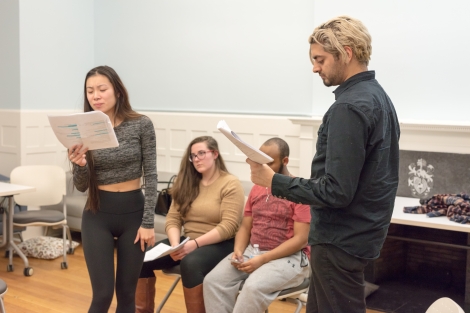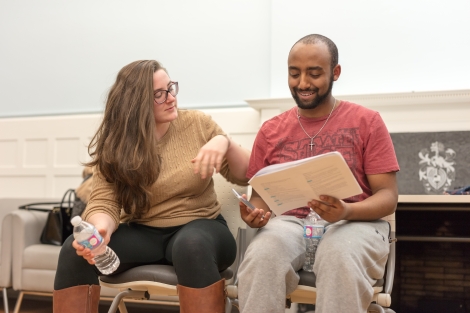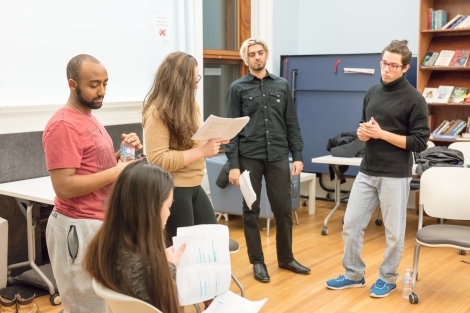If theatre has any supreme ability, former U of T student actor and theatre aficionado Jane Smythe knows it is the power to share and heal.
“I had a lot to get off of my chest a couple years ago, so I started doing playwriting because it was the only type of writing I felt I could engage with,” Smythe said. “I wanted to tell my story in an art form I thought… could possibly express the way I could want it to be. For me, the idea of theatre is the opportunity to do whatever type of art form you want to do — you can sing, dance, [move], or literally paint a picture on stage and it could be part of your play.”
In its twenty-fifth year of existence, the University of Toronto Drama Festival will serve its audiences from February 9–11 with nine unique plays: Family Portrait; Swipe Right; Just the Fax, Ma’am, Just the Fax; A Lullaby and Apology; Suzanne; Mama; A Perfect Bowl of Phở ; Monsters; and Touch.
As an accurate reflection of life in Toronto and the university’s eclectic student population, diversity exists within each play; it is channelled through their writers, casts, crews, and subject matter. ‘Diversity’ feels like the perfect word for 2017. It’s grown up from its previous existence as a buzzword used insincerely for the purpose of sounding progressive to a phrase that more meaningfully denotes inclusion.
Representation in storytelling
Each theatre production varies in script, actors, and directors, but they all serve the ultimate purpose of helping us to better understand the human experience.
Smythe is a veteran of the Drama Festival, having directed the UC Follies production Swim To The Moon in 2015 and winning the IATSE Award for Technical Achievement. She also wrote and starred in their 2014 festival entry, The Sessions, as the character 21, a woman struggling with the traumatic experience of having been raped at the age of 13.
Her current theatre troupe, Glass Reflections Theatre Collective, maintains a mandate that promotes inclusion and diversity. Smythe serves as General Manager, and she co-founded the troupe with Artistic Producer Deborah Lim, Artistic Director Stephanie Zidel, and Assistant Artistic Producer Grace Poltrack.
Through writing and performing in The Sessions, Smythe was given the opportunity to engage with her peers and tell her own personal story, one of the paramount benefits of the art form. Lim directed the show.
“She told my story in a way that was incredibly vivid and was a therapeutic experience for me to share my vision… and kind of see the transformative nature of working with a group of people and having a collective understanding of things and kind of understanding that their feelings are valid,” Smythe said of Lim’s direction. “There was kind of this healing effect between everyone who worked on the show.”
This year at the Drama Festival, Swipe Right touches on a common topic — bad dates. The play explores how microaggressions surrounding identity shape online dating and people. For co-writer Savana James, a priority is allowing performers to explore their own identities in their characters, and to create stories minority audience members can relate to.
“I love that with Swipe Right, we wrote roles that belong to diverse performers, because it gives them opportunity that doesn’t often exist,” James said, “As a storyteller, I feel like I have a responsibility to create these stories that don’t exist, to start new conversations and opportunities in theatre. I want to tell stories that haven’t been told before. The types of stories I wish I had got to hear.”
The play Touch, written by Marium Raja, analyzes the different types of physical contact that are made between people and the importance behind what many deem to be a simple act. The play follows the main character, Florence, her difficulties making contact with others, and the different people and relationships she encounters throughout her journey.
“This play follows the stories of her and people she knows — not necessarily all friends, some are acquaintances, some are strangers, but all of them brush shoulders as we all do in our daily lives. Brief moments of contact, some shining, others we’d rather leave behind in the dark,” Raja said.
When Raja sat down to write Touch, she wanted to prioritize diversity in the process of casting the play, as Florence was written to be played by a person of colour.
“None of the characters were specifically written with specific races in mind, but I knew beforehand that I wanted to prioritize genderqueer actors and actors of colour,” Raja said, “This play is meant to reflect the universality of everyone’s experiences with physical contact, and I wanted the characters to be representative of the people I have come to know at this university.”
Controversy over the Oscars
Diversity may be the toast of Hollywood at the upcoming eighty-ninth Academy Awards, as black-led films Moonlight, Hidden Figures, and Fences have helped diminish last year’s #OscarsSoWhite controversy.
The controversy, a shared outcry that Hollywood is racist, was fuelled in part by host Chris Rock’s introspective monologue as he demanded that “black actors receive the same opportunities as white actors.” Rock’s single mistake was not demanding a more intersectional mandate in which all people of colour should be made a priority.
Raja doesn’t believe that the racism in Hollywood has been solved in the short period of a year simply because films featuring black actors are being nominated for Best Picture.
“It would be simplistic to think that years of systematic racism have been erased just because the Oscars just managed to ‘tie’ with their 2007 record of seven non-white actor nominations,” Raja said.
Manchester by the Sea, Director Kenneth Lonergan’s family drama, fits the standard mould of a seminal Best Picture winner, led by a gleaming pair of past, present, and likely future Oscar nominees in Casey Affleck and Michelle Williams. Like in Good Will Hunting 20 years ago, it illuminates a story about white male grief in contemporary Massachusetts.
While Smythe wasn’t interested in seeing a film starring “Ben Affleck’s younger brother,” she doesn’t feel like Manchester By the Sea should be shunned just because it is considered by many to be a traditional heteronormative “white film.”
“I don’t think white films are invalid, or films that are made by white people are invalid, there just needs to be support for different types of films,” Smythe explained. “When you look at all of these blockbusters, they’re primarily white and that means that other types of movies aren’t being supported as much… I think the issue is the fact that there’s not enough money being spread around to these different types of productions and different stories.”
Affleck is a divisive figure to anyone who seriously cares about film. He’s an individual who can be mesmerizing as a grief-stricken janitor and who can also encapsulate all the wit and charm that is required to host Saturday Night Live. The 41-year-old is likely to win Best Actor this year, over his fellow nominees Andrew Garfield, Ryan Gosling, Viggo Mortensen, and Denzel Washington, the lone person of colour in the category.
While Affleck’s performance in Manchester by the Sea is brilliant though, the Oscars seem too satisfied with allowing the same voices to repeat throughout history, telling the same narratives.
And glamourizing Affleck’s appeal is particularly worrisome because of the sexual harassment litigation he settled in 2010. A combination of his privilege and talent allowed him to be a subject of debate on whether deplorable behaviour should outweigh the gravity of a performance. This further pushes common logic towards the ultimate question: what is the point of the Oscars anyway?
Raja is interested in the Oscars advancing diversity; she argued for a more diverse group of judges and for the inclusion of quotas, which could be beneficial strategies to help bring about meaningful, fundamental change.
“Having a more diverse Academy panel is a start,” Raja said. “Having quotas, as aggravating as the term is to me, is a start. It is difficult for marginalized voices to effectively call out to be heard, because, well, they’re kind of marginalized. When those in power, those with affluence and the ability to open up opportunities for people who have the same qualifications and talents as their privileged peers, actually use their positions to create those opportunities, that is when more diverse work can be created.”
Smythe recalls the elation her Iranian friends shared with her when A Separation won Best Foreign Language Film in 2012, but she later wondered why it wasn’t also nominated for Best Picture. “It just seems that really mainstream films get nominated for Oscars, like, what’s the point of Best Foreign Language Films and why can’t those films be nominated for Best Picture? Because those films have the diversity you’re looking for,” Smythe said.
Comparing film and theatre
Raja, James, and Smythe find that the assumption of theatre being more diverse than film is a loaded one and not entirely accurate.
“There needs to be change,” Smythe said, “I think that theatre has a long way to go in terms of diversity. There’s incredible work being done by Indigenous people and people of colour, people who identify as a part of the LGBTQ, people with mobility issues, and the deaf community; it’s not mainstream, all the mainstream stuff is still white.”
Raja has the same mentality. “As a queer person of colour, it’s fairly important to me,” Raja said. “The more intersections you have, the farther you are from being a cis white straight male, the less you are represented in most forms of media.”
James noted that the call for more representation has been answered, but it is not enough.
“I don’t think the difference [between film and theatre] is as large as people may think,” James said. “I think while theatre has seen a growth in diverse storytelling, much like in filmmaking in recent years, there is still much work to be done. Sure, we have shows such as Hamilton, which swept the [Tony awards] last year, but we cannot pat ourselves on the back for one good year. We need to make sure going forward that the inclusion of marginalized people is considered every year.”
Smythe feels there is a lack of funding for films relating to people of colour. Raja adds that people of colour face abhorrent and direct racism when they do break down barriers and ‘succeed’ in major Hollywood productions.
“When you see the significant backlash that actors like John Boyega and Leslie Jones have gotten just for doing the work they do, when you look at the fact that the top contender for a biopic about the Persian poet Rumi is Leonardo DiCaprio, it’s glaringly obvious that we have a problem,” Raja adds.
The underlying truth about both art forms, regardless of their stylistic differences, is that in the mainstream neither have been very diverse. At least U of T’s Drama Festival presents a forum for theatre to shine through in its best light, as a kaleidoscope of the voices of real and diverse students.
“The great thing about the idea of pushing for further diversity is that there is literally nothing bad about it. People can afford to be a little more aware of their privilege, because everyone has privileges,” Raja said. “It is up to us to be aware of it and use it so that those who do not can be heard as well,” she added.
Swipe Right premieres at Hart House on February 9, the opening night of U of T’s Drama Festival. Touch premieres February 11, the closing night of the Drama Festival, also at Hart House. This year’s Academy Awards are on February 26.





